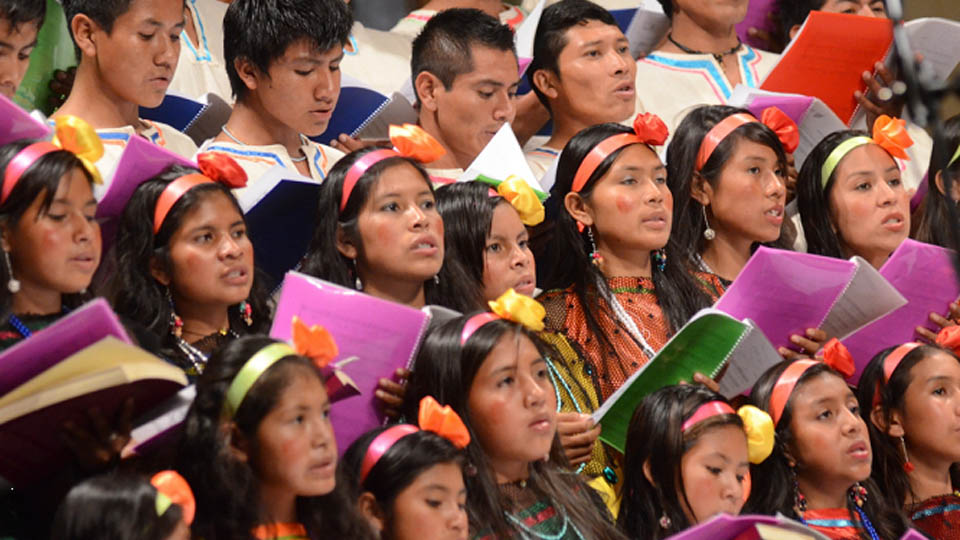Repertoire from the time of the Jesuit occupation of Bolivia is being brought to light through performance-based education and research into the country’s Baroque musical heritage, which was highlighted for its impact for the RCM's REF2021 submission
Bolivan Baroque is a research, education and performance project which aims to revive and develop performances of repertoire from the Jesuit mission church archives of the Chiquitos and Moxos Indians. Chair and Head of Historical Performance Ashley Solomon has been collaborating on the project since 2002 with Polish Jesuit Divine Word missionary and musicologist Dr Piotr Nawrot, and the Association Pro Arte Y Cultura (APAC).
The Jesuits founded ten Missions deep in the Bolivian jungle from their arrival in the 1670s through to their expulsion in 1767, encountering an indigenous people who were keen to learn and make music. Each Mission collected music for its worship, including masses and motets as well as instrumental and keyboard compositions. Having closed after the Jesuits were expelled, over the following years the Missions closed and their music libraries became ‘time capsules’ of 17th and 18th century music. Some of this music was written in (and brought from) Europe, but it mainly comprised anonymous compositions written by the locals.
Fifty years ago this music was considered lost. However the rediscovery of manuscripts in recent years has helped to change our awareness and knowledge of what was written in the Missions during the Jesuit occupation, namely that 17th and 18th century reports about the performing and compositional skills of the Indians have not been exaggerated.
In 2018 the Bolivian Baroque project team uncovered texts composed in the indigenous Guarani language by the local Indian population, overturning the assumption that only Spanish or Latin was used to support the Jesuit’s evangelisation of communities. This discovery gave a new impetus to the project, helping to further explain how these remote communities kept their cultural identity intact during and after the expulsion of the Jesuits.
Professor Solomon established the Arakaendar Bolivia Choir and Baroque Orchestra to introduce this music to international audiences at the biennial Festivals of Renaissance Baroque Music de Chiquitos, and across the world through concert tours, recordings and broadcasts. As a result Bolivia now has a Baroque Choir and the only orchestra using Baroque period instruments to a professional standard. The project team have developed an education programme to enable graduates to return to Bolivia as professional teachers and musicians.
Supported by RCM research funds, Solomon regularly returns to Bolivia to help the local community interpret this unique repertoire by leading masterclasses, lectures and collaborative sessions alongside RCM Historical Performance students.
During the 2022 Festival Misiones de Chiquito, eleven RCM students joined performances of newly discovered Moxos and Chiquito Indian choral and orchestral music in Mission churches in the Amazonian rainforest. In February 2023 Solomon returned to audition singers from the Urubicha rainforest to join the Arakaendar Choir for the 2024 Festival. Five singers received four days of intensive training on the interpretation of Baroque music. A tour of Brazil is planned for June 2024 to perform recently discovered 18th music from the archives of the Chiquitos Indians.
This project, which is very much about knowledge exchange and the sharing of the latest research, will lead to new recordings and publications of this remarkable archive of music for the world to share.








